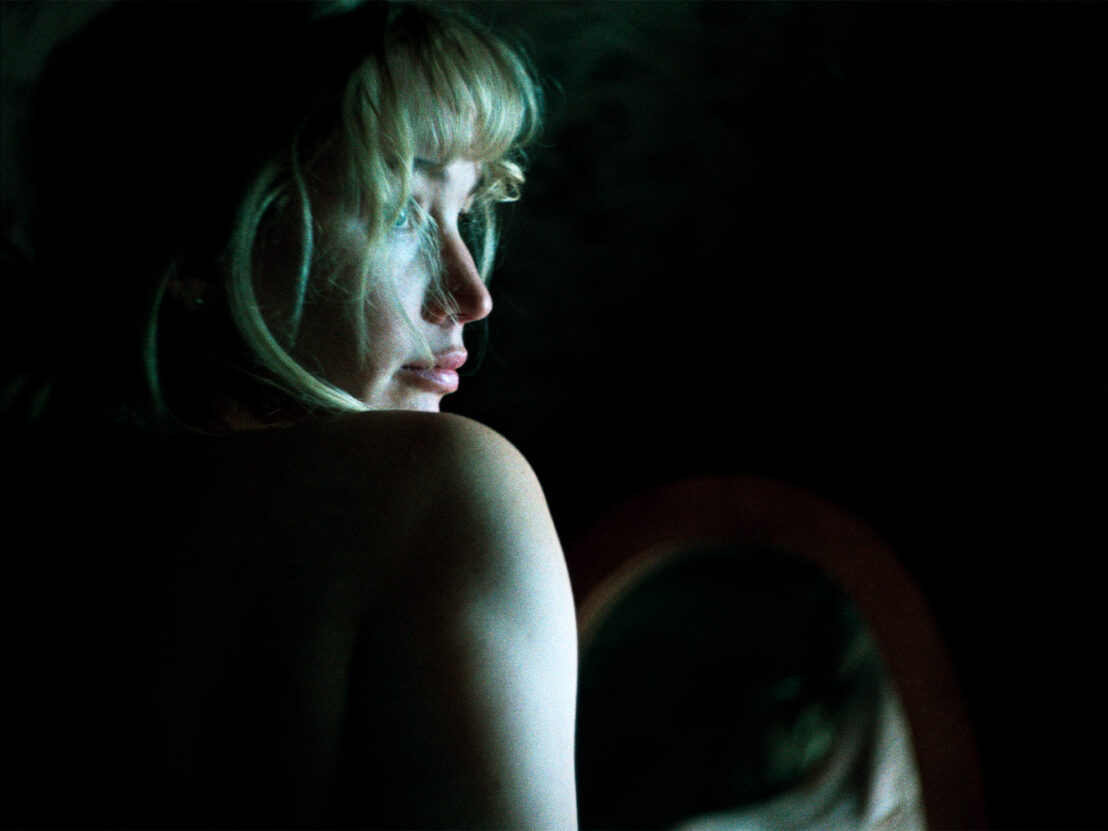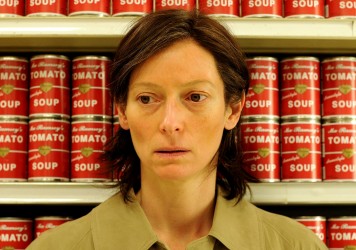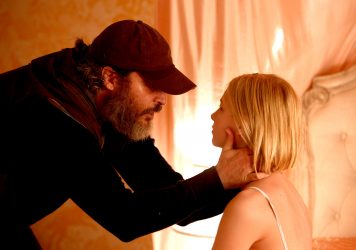
Lynne Ramsay finds a kindred spirit in Jennifer Lawrence, joining forces for a blistering portrait of a woman on the verge of a nervous breakdown.
If you haven’t lived it, it’s hard to explain, that gnawing discomfort that makes you want to do something certified-capital-C loony-bin-admission Crazy. Walk into traffic or throw your body down the stairs or slash up your skin with a razor blade or bite one of your fingers off like a baby carrot. It’s like a lot of things. Like bugs playing house under your skin. Like the hum of television static after programming stops for the night. Like going out of your fucking mind. Times used to be that they’d just call you hysterical and throw you in an institution indefinitely; maybe try electroconvulsive therapy or a lobotomy to make you more agreeable. (I joke about lobotomies a lot with my other mentally ill friends. I guess the idea of removing a part of my brain to make me a little easier to manage is pretty funny, like that old Wanda Sykes gag about the detachable pussy.)
So here are Grace (Jennifer Lawrence) and Jackson (Robert Pattinson), transplants from New York who take on the ruin of his uncle’s old prairie home after he shot himself. He’s a musician, she’s a writer. They’re truly, madly, deeply in love, and soon enough baby makes three: a sweet, chubby-cheeked little poppet who gurgles and cries and babbles and does all the things babies do. Jackson goes back out to work, then brings home a dog that barks constantly and pisses on the floor. Grace plays with the baby and dances in her underwear and masturbates and drinks from sweating bottles of Budweiser in the summer heat. And Grace goes out of her fucking mind.
Ariana Harwicz’s novel ‘Die, My Love’ is a stream-of-consciousness assault on the senses; a nameless woman lives with her husband and baby and in-laws in a rural French farmhouse, and retains a tenuous grasp on reality. Her thoughts are violent and tragic and animal – she fantasises about a neighbour with a motorbike, about the creatures in the forest, about killing and being killed. It’s easy to understand why a filmmaker like Lynne Ramsay might be interested in adapting a text as wilfully offputting, as tragic and complex and feral as ‘Die, My Love’. And this filmable script – co-written with Enda Walsh and Alice Birch – doesn’t always work, certainly not with the same heft of Morvern Callar or You Were Never Really Here, frenetic and disjointed with lots of wriggling tendrils and not much interest in exploring more than a handful of them. (LaKeith Stanfield gets short shrift as Grace’s mysterious biker neighbour.)
But the cinema of Lynne Ramsay is cinema of the senses, raw and delicate and alive, like holding a butterfly cupped between your palms and feeling its wings beat against your skin. Jennifer Lawrence completely understands this, inhibiting Grace with a total lack of vanity as she crawls on all fours, as she violently wrecks a small bathroom, as she tries to come back into commune with her body after something as destabilising as bringing another person into the world. She’s never been better, vulnerable and terrible and totally unpredictable, matched gamely by the always compelling Robert Pattinson, utilised as a wet, sweaty, semi-useless man completely ill-suited for Grace’s needs. But a classic Wife vs Husband meltdown à la Scenes from a Marriage or Possession would be too tempting and familiar; the heart of Die, My Love is that Grace and Jackson do love each other, do want each other, underscored by the use of John Prine and Iris DeMent’s country classic ‘In Spite Of Ourselves’. Their romance is one of pushing and pulling, a dance you don’t learn the steps to so much as feel in the geography of your bones. And sometimes you go where the other can’t follow. Love is its own sort of psychosis.
While much will be made of Die, My Love’s gut-wrenching portrayal of postnatal mental illness, a little-studied and even littler-understood condition that makes witches out of women, the experience Ramsay captures in Grace’s story isn’t unique to those who have children or are ill in the aftermath of their birth. Psychosis is much bigger, much stranger and vicious, and while Grace is a new mother, her illness isn’t solely attributed to her son’s arrival. She adores him, even if she looks at him like he’s an alien. And how then, if you are psychotic, can you divorce your illness from your art? Grace’s husband, her mother-in-law and her well-meaning neighbours all keep asking how her writing is going. Grace tells them she’s quit. It’s less trouble than trying to explain blood comes easier than ink.
Ramsay articulates the inarticulate, here through her saturated blues, yellows, browns and greens, the colours of grief and sickness and rot…but also new life, summer skies, and hope. The Academy ratio is an homage to Repulsion and Rosemary’s Baby that gives the sensation of being boxed in (of climbing up the walls) and Seamus McGarvey’s cinematography renders the beautiful terrible and vice versa. Ramsay also contributes music to the film’s noisy, messy, intentionally untethered score, including the exquisite cover of Joy Division’s ‘Love Will Tear Us Apart’ that plays over the film’s credits – but Die, My Love isn’t a eulogy. It’s a forest fire, destructive, angry, hotter than hell. And when it burns out, something new springs out from the ground.
To keep celebrating the craft of film, we have to rely on the support of our members. Join Club LWLies today and receive access to a host of benefits.
Published 18 May 2025

Lynne Ramsay’s first film for nine years is a dizzying visual trip anchored by Tilda Swinton’s superlative central performance.

Joaquin Phoenix and director Lynne Ramsay combine forces to deliver a sensational cinematic sucker punch.

The You Were Never Really director talks framing violence and working with Joaquin Phoenix and Jonny Greenwood.